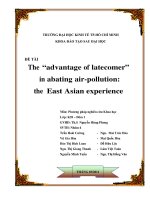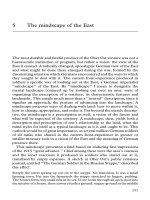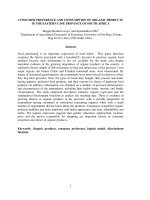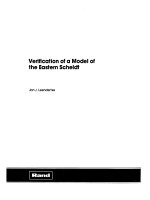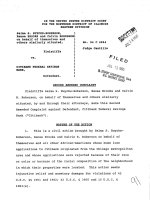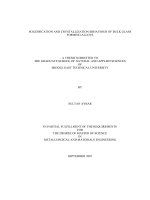The mindscape of the East
Bạn đang xem bản rút gọn của tài liệu. Xem và tải ngay bản đầy đủ của tài liệu tại đây (122.54 KB, 25 trang )
5 The mindscape of the East
The most durable and fateful product of the Ober Ost venture was not a
bureaucratic institution or program, but rather a vision: the view of the
East it created. A radically changed, apocalyptic German view of the East
and what might be done there emerged during the war, formed by the
disorienting situation which Germans encountered and the ways in which
they sought to deal with it. The eastern front-experience produced in
soldiers a speciWc way of looking out at the East, a German imperialist
‘‘mindscape’’ of the East. By ‘‘mindscape’’ I mean to designate the
mental landscape conjured up by looking out over an area: ways of
organizing the perception of a territory, its characteristic features and
landmarks. This entails much more than a ‘‘neutral’’ description, since it
signiWes an approach, the posture of advancing into the landscape. A
mindscape proposes ways of dealing with land: how to move within it,
how to change, appropriate, and order it. Far beyond the merely descrip-
tive, the mindscape is a prescription as well, a vision of the future and
what will be expected of the territory. A mindscape, then, yields both a
description and prescription of one’s relationship to the land, what the
mind styles for itself as a typical landscape as it is and ought to be. This
outlook would be of great importance, as several million German soldiers
of all ranks who shared in the eastern front-experience in greater or
smaller measure took in a vision of the East and the meaning of German
presence there.
This mindscape presented a land based on enduring Wrst impressions
of the 1915 ‘‘great advance.’’ Chief among these were the area’s vastness
and the inner reactions it produced in soldiers who stared out at it,
transWxed by empty expanses. A sketch in Ober Ost’s public relations
journal, entitled ‘‘The German Soldier in the Russian Steppe,’’ described
this eVect:
Steeply the street sprang up out on to the steppe. No transition. It was a small
farming town. Far into the farmyards the steppe stretched its Wngers, probing.
The houses form only small rifts in its sea. If one looks through an open door into
the interior of a house, there yawns a further ground: steppe-ground in the middle
151
of the town. And all about the town it surges, like the ocean around a small
sea-gnawed, fjord-rich island. Now the soldier went on a narrow, scarcely dis-
cernable path. The steppe took him into its spell. He stood still and looked deep
into the round. Over there the town slept under few lights – like bright dreams.
And to the right there stood now the moon – a bloody half-moon. He went further
. . . In the distance, at the horizon, a brighter line now bordered the blackness.
There lay the East, the Russian endlessness. He stared into this land, which in its
distant expanses makes the eyes wide and yet directs the gaze inwards, which
leads people into inWnity, and yet leads them back to themselves.
1
Another oYcial’s novel described the oppressive feelings of a train jour-
ney through the territory for soldiers, ‘‘the pressure which lay upon them,
as they looked out into the Xeeing vastness.’’ ‘‘There is something so
destabilizing in this moving and sliding away,’’ one character complain-
ed, aching with ‘‘the feeling of being without a homeland, of being
uprooted. Then life seems to one a negative experience of the soul.’’
These impressions built to an overwhelming reaction:
The sun had risen, and a pale illumination Xickered over the plain. As far as the
eye could see – nothing but plains, gray, dead, endless, and sad. And the soldiers,
who in their journey through the Ukraine . . . had not been able to shake the
impression – they felt it vaguely. This was Russia. Like a spectral concept the
word stood before their souls. Three days and three nights had passed, and the
picture was still the same. Then the uncanny feeling strengthened in them against
the land – becoming an unconscious, vague hatred, which blazed up in their
hearts, which they felt but did not think. A hatred against the size of the land,
which had swallowed them, as a big Wsh swallows many smaller ones, and which
held them here against their will. Only a few thought more clearly. But they, too,
felt at this hour only a vague, crippling helplessness, coming from the land and
lying on them like fetters, binding them.
2
As another soldier recorded in his diary, when he was under Wre and
looked out at the battleWeld, he saw emptiness: ‘‘Countless farms and
entire villages are in Xames. One sees not a single human creature in the
wide plain, spreading up to most distant eastern heights. And yet, in this
frightful vacuum which is only Wlled with the noise of rumbling artillery
and rattle of machine guns, thousands lie in battle.’’
3
A student seconded
this, declaring that the Eastern Front surpassed even the ‘‘typical empti-
ness of the modern battleWeld,’’ which here was truly ‘‘disconsolate,
irretrievable.’’
4
Images of open spaces riveted artists, like famed expres-
sionist Otto Dix, who arrived in the East as a sergeant in winter 1917, and
was inspired to draw abstract sketches of movement across steppes and
landscapes of isolated villages.
5
Paintings by war artists recorded similar
impressions of expanses.
6
Even the cover of the Tenth Army’s songbook
showed endless ranks of soldiers marching through snow across empty
lands.
7
152 War Land on the Eastern Front
Other features disconcerted newcomers, as wild nature brought all of
its force to bear on them. Winters of terrible ferocity brought cutting
Siberian winds:
Now there came cold such as I have never felt before. The thermometer fell to 38
degrees below zero. Dawn was the coldest. It was so cold that the air shimmered.
A little stream, about a meter deep, with quick-Xowing water, was frozen to the
ground so that we were forced to melt clumps of snow and ice in pots on the stove,
if we wanted to make coVee or have water for other purposes. Bread and the other
supplies, which were brought by ski, were hard as stone. If a man did not have his
head protector pulled over his nose, in Wve minutes the tip of his nose was
yellow-white, all of the blood drained away. Then there came the order that we
had to observe one another. Each also received a frost ointment to rub on the
frost-bitten spot and to bandage it up. ‘‘Man, you have a white nose!,’’ one heard
often . . . The nose, ears, the skin on the cheekbones, Wngertips, toes, and heels
froze most quickly.
8
Letters from soldiers at the front expressed horror at the land. With spring
thaws, lakes appeared out of nowhere, Xooding bunkers and positions,
and men on watch drowned at their posts or were swept away in icy
currents.
9
Hostile nature loomed large during lulls in the Wghting as ‘‘days
passed in monotony. Snow and fog, fog and snow – that was more or less
the whole variation.’’
10
In the trenches, ‘‘life took its usual course: stand-
ing watch, bad food, and the torment of lice.’’
11
On the Eastern Front,
soldiers found themselves battling nature as much as human enemies, a
decisive feature of this front-experience.
While soldiers observed these unfamiliar aspects of the occupied terri-
tories, it is important to note that the eastern front-experience was not
exclusively a confrontation with romantic strangeness. Indeed, more
ordinary but even more unsettling to morale were everyday ordeals of
boredom, homesickness, and hopelessness bred of personal losses and the
cumulative impact of the horrors seen in this theatre of the war.
12
Long
separation from family was an ordeal for many. One oYcial felt wrenched
inside when, home for vacation, to his child he was ‘‘the foreign man from
Russia.’’
13
Another soldier wrote that he only appreciated the real meaning
of homeland, ‘‘for the Wrst time now, now that I am in a foreign place in
enemy land.’’
14
Frustration with their dull existence wracked soldiers in
quieter sectors. One exclaimed: ‘‘we do not Wght, we do not starve, we lie in
dirt, we kill ourselves through this useless boredom. If only the war would
soon end!’’
15
These feelings could run together and become identiWed with
this miserable war land, as the same man reXected coldly in a letter:
Is it not the greatest, unknown, holy feeling to have dead friends, who have died
heroes’ deaths? And so likewise, to see a burned village, empty gables torn up as if
by madness, destroyed human habitations, open cadavers and gray heaps of
153The mindscape of the East
corpses, Wres, foreign, foreign faces pressed to the ground, lying as if branches
broken by a storm? I have scarcely felt any horror at that. And who has ever seen
such pictures with his own eyes? In the face of such things, words fail . . . the life of
one or another has become unimportant ...Ifelt that those who had passed on
were close by me and believe now I’ll soon be with them and free of all torment . . .
How the world has changed and become empty!
16
Numbed by repeated horrors, soldiers could give way to deep nihilism as
they regarded their own lives and surroundings.
The mindscape deWned the areas soldiers looked out over as intrinsi-
cally lands of war. Soldiers Wrst entered these lands as war raged, with the
area on Wre. It was also war that gave them free disposition of the lands
and peoples: ‘‘War is war,’’ went the common excuse during requisitions.
As lands of war, the vistas of the mindscape were in motion, since new
conquests expanded the area eastwards by leaps and bounds. Ober Ost’s
state seemed a growing organism. Occupiers could not merely settle in
and come to rest. Rather, the mindscape was dynamic, directing their
attention and energies ever further East.
In this mindscape, Wlth was emblematic of eastern lands and peoples.
Even after the front passed, an abiding impression was Wxed that these
lands were unclean, while what soldiers saw and experienced of the roads
and displaced peoples heightened the impression. Diseases lurked every-
where in the disorder. Cities overcrowded with sick and starving refugees
disturbed a German visitor: ‘‘the awful smell of the poor in the ghettos
rolled oppressively over the senses and impressions. HorriWed, I yelled –
‘Bring gas masks!’’’
17
In one archetypal moment, Germans claimed that
in Wilna, retreating Russians had ‘‘dirtied and stunk up [the place] in the
most unspeakable way. On the ground Xoor of City Hall, horse manure
lay three-quarters of a meter high. On the upper Xoor, which horses could
not reach, their riders took over the animal act. Today, the rooms are
sparkling clean – only the . . . smell of chalk and disinfection reminds one
of the dirty business found here.’’
18
Special aversion was reserved for
unfortunate refugees crowded into Wilna’s ghetto. Military Administra-
tion Lithuania’s new chief von Heppe reacted furiously, announcing that
it ‘‘oVended eyes and nose in equal measure . . . probably the wildest
example of Wlth and neglect that I have seen along these lines, in spite of
the fact that in over three years I had become used to all sorts of things in
this area.’’
19
Little allowance was made for the fact that war had played its
part in reducing the natives to such misery. Parasitic insects and lice
soldiers discovered on their own bodies were constant reminders of the
dirt and disease they ascribed to the lands and peoples. These omnip-
resent creatures horriWed soldiers and soon became hallmarks of the East.
154 War Land on the Eastern Front
One soldier quipped, ‘‘At Wrst I thought they were some kind of Russian
ant.’’ Natives were blamed for this infestation, which they had somehow
passed on to Germans. In summer, plagues of Xies and gnats appeared.
20
Filth became symbolic of the lands and peoples before German Work
grasped them to change their natures. These areas were also ‘‘dirty’’ and
‘‘disorderly’’ in their complexity, chaotic mixtures of languages, peoples,
religions, and histories, as Ober Ost’s ‘‘Map of the Division of Peoples’’
so trenchantly pointed out. After Wrst impressions of dirty lands and
peoples, the mindscape surveyed an abidingly dirty East.
Further, the mindscape directed attention below the land’s surface, to
peer into the soil. From their arrival, soldiers remarked on the ground and
its qualities, paralleling the military utopia’s agricultural fantasies. The
soil seemed rich, but undrained and uncultivated, given over to rank
growth. It held immense potential, but would have to be won.
21
An
economic oYcer in Kurland recalled the Wrst spring breezes over the ‘‘raw
land,’’ which under deep snow and ice, he imagined, ‘‘dreams of Kul-
tur.’’
22
Its qualities were foreign, as the soldier in the landscape felt: ‘‘He
went further, ever deeper into the steppe and breathed the strange-
smelling air of Russia, which smells so strongly of smoked resin. His eye
had accustomed itself to the darkness. He saw now the landscape, this
poor, barren land, which trembled underfoot, as mothers tremble, when
they want to quiet their child and have no food.’’
23
For some, ground
underfoot was haunted by ghosts and the past: ‘‘All around it whispered.
The earth here is still blood-soaked, the air pregnant with red atoms,
which Wnd no peace yet, which swirl about the nocturnal wanderer. The
soil breathes complaints, moans out sighs: in the air sound unsung
melancholy hero-songs, unspoken whispering words of fear, withheld
wild cries of battle. The landscape speaks its whispering language.’’
24
This soil was primeval, unworked, but if its strangeness could be over-
come, it could be possessed.
The mindscape also revealed the peoples, laying bare their ‘‘essences’’
of irreducible ethnicity, exposing their characteristic powerlessness, mis-
ery, poverty, and primitive ways. These peoples had no genuine Kultur:
their relationship to nature showed them to be incapable of it. All their
existence appeared ahistorical and ruled by nature, determined by an
environment which they could not resist. In the mindscape, these con-
clusions were drawn from the land and then read back into the ethnic
landscape. The soldier in the steppe listened and found that
the landscape speaks its whispering language. He understood, he reXected: We
Germanic people build up – create – the Slav broods and dreams – like his earth.
155The mindscape of the East
One feels and understands that in these wide plains, in the monotony of the
heath-lands. There is no activity there – only a tired twilight and premonition.
There is fate, not will. And as the land, so its poetry. The wide horizon, which
loses itself in gray mists: the bleakness of the steppe, which only brightens once in
the autumn magic of the heather, grieves in the longing, inconsolable Russian
lyric poetry. These poets of Russia are the speaking spirit of this steppe, with . . .
limitless gray imagination: they write tragedies over into moments and create out
of tiny moments tragedies, which are never forgotten by one who reads them
once. And Wnally their bitterest, bloodiest tragedies aVect the Westerner like lyric
poetry. Even the animals here take on the landscape’s gloomy character. The
nightingale, oriole, bittern, all have become the sound out of the plaint of a
reticent landscape, sounding inwards. In the epic poetry, however, rears the
monumentality of the borderless steppe. The German is powerful in being organ-
ized, the Englishman in his trade-political colonization – the Russian in his epics.
Who has written more monumentally than Tolstoy, Turgenev, Dostoevsky, to
name but a few? . . . One understands them for the Wrst time, understands them in
the middle of the steppe at night. This ghostliness, which haunts above the wide
plains and heaths on dark nights, lit by no star, is in their works. The daemonic is
in their Wgures as in the nights of the steppe.
25
The German soldier’s reaction was a confusion of contradictory im-
pulses. In seeing these lands, he felt a new understanding for the peoples,
a certain new sympathy and closeness, but also repulsion. Their identities
seemed not conscious projects or complicated weavings of historical
circumstance, choice, and eVort. Natives were not agents, actors making
choices, but slaves of necessity. Soldiers scanned native ‘‘faces’’ and
‘‘visages,’’ trying to discern inner natures, as Jungfer recorded in his novel
of life in the rear areas, The Face of the Occupied Territory. Ethnicity came
to be regarded as race, something immutable, physical, and visible.
Natives were sometimes seen as separate nationalities, but since so much
about their essential natures was alike, they could also often seem inter-
changeable, referred to collectively as ‘‘Poles’’ or ‘‘Russians’’ or by mildly
derisive labels like ‘‘Panje.’’ Soldiers looked out at a native scene so varied
that there were no clear distinctions to be discerned. Chaos itself seemed
characteristic of those lands and peoples.
The dynamic mindscape turned description of the land into a prescrip-
tion for how it was to be faced, confronted, and approached. Attention
was drawn to the East, expressing itself in a Wxed eastwards stare: full of
tension, a mixture of attraction and desperate repulsion. This stare of the
‘‘Watch in the East’’ was diVerent from that in the West, the defensive
‘‘Watch on the Rhine’’ on the French border. Here, it was energetic and
expansive, an occupier’s gaze Wxed on new horizons, rehearsed to exhaus-
tion in epically bad poems by ordinary soldiers published by front-
newspapers:
156 War Land on the Eastern Front
The Watch in the East
Do you know the street, deep and long?
It comes from the Baltic coast
And leads through hill, valley, and slope
Far away to Hungarian land.
No Xoods of people, glory of architecture
Enliven its tracks –
There we stand on loyal watch
Before battle-Wlled plains.
Just as it developed in wild conXict,
In hot, bloody striving,
So it resists the storm of time,
Wants to feel destruction itself.
Because behind the wall of these roads
In the distant German districts,
There all the brothers look up to us
And all the dear women.
And if in nighttimes there surges blind rage –
Then look up high how the stars revolve,
Which above a sea of blood
Show the way into the bright future!
And, listening, look along the street
Where the quails make their song!
There rises the joyful song of the lark
Almost as in peacetime days.
26
The watch in the East peered into the expanses ahead, ready to ward oV
threatening nature. As the Tenth Army’s theme song announced, ‘‘You
have swept clean the homeland, / And have opened the way to the
East-land! . . . Now you stand, as if formed out of steel / Faithfully holding
what has been conquered.’’
27
Another song, that of ‘‘Home Guard Troop
Three,’’ also declared:
We stand between mountains and graves and stones,
Between ruins and coYns and dead men’s bones!
We keep the watch in the East, tenacious and true;
Always at our posts – We, the Home Guard Troop Three.
Now we are in trenches and foxholes,
The land which we have, we will hold on to it Wrm.
28
Once the gaze was Wxed, the mindscape then prescribed movement
eastwards. While the ‘‘wall’’ which the front represented defended
Germany and home, it also strained forward, an aggressive border on the
move eastwards. Roads to the East led to apocalyptic landscapes, seas of
blood and planes of existence Wlled with battle and slaughter:
157The mindscape of the East
On the Advance March
Like a dark gray coat
The heavy night lowers itself.
Without respite, restless, ever further
Eastwards we carry the battle.
The smell of burning and rubble and corpses.
Pestilence is every pull of breath.
And the jackdaws, hoarsely croaking,
Reel by in heavy Xight.
And with wild greed a vulture
Breaks out of the dark realm of clouds.
Horror and terror lie
Over the blood-soaked Weld.
Let it lie, let it be!
Battle is battle and war is war!
Cheerful and without respite, restless,
Eastwards we carry victory.
29
The mindscape envisioned German soldiers carrying battle outwards,
eastwards into nightmare landscapes. These were lands where limits were
broken, in the outside world as well as in the soldier’s interior, with
‘‘Battle is battle and war is war’’ the only remaining morality in the East.
Even as the area repelled the occupiers while they ordered the land,
their military utopian vision also made them want to possess it forever.
Over time, they found themselves coming to feel at home, as a visiting
journalist related: ‘‘Last year . . . my eldest son was in the Weld in
Lithuania for months. He, too, was shocked at this mix of horror and
Wlth. However, as he saw the blooming, ripening, and gathering of the
harvest, he wrote one day: ‘And in spite of it all, one becomes fond of
this land. What could one not make out of it!’ That is the German
way.’’
30
It was supposedly characteristic of Germans that they settled
readily in foreign places and soon grew accustomed to them in a way all
their own:
The German, however, draws about his surroundings the weaving threads of his
sensibility. Even if he should discover after a year that he has settled in an evil
swamp area, he is no longer to be removed – because of his character. There is
something to this. The German loves work for the sake of work. That which is
created is holy to him, because of the feelings out of which he created. It pains him
to leave the trench in which he spent the most diYcult hours of his life. Best of all,
he would like to take it home with him as a memento.
31
This supposed national characteristic was demonstrated in Ober Ost: ‘‘If
one claims abroad that we Germans become uprooted quickly, as soon as
we leave our native plot, then we may add, with good reason, that we also
become rooted very quickly, where duty sets us down. Our soldiers at
158 War Land on the Eastern Front
work at agriculture in the middle of the Lithuanian desolations clearly
demonstrate for us the German ability to adapt to diYcult conditions.’’
32
Yet feeling ‘‘at home’’ in foreign lands could be perilous, as soldiers risked
‘‘going native’’ and ‘‘going to ground.’’ OYcer Victor Jungfer (who
himself later went native) depicted life in the rear areas in his novel.
Soldiers found themselves sinking in place. In remote areas and towns,
they gave themselves over to drinking, card-playing, and exploiting native
women. Older men and wounded soldiers succumbed easily to the temp-
tation of lording their power over prostrate native populations. Many
soldiers took up with native women in relationships where the women
were forced by circumstances to prostitute themselves for food and army
issue bread. This was a world apart, dominated by males, standing in
absolute authority over subject populations, which were disproportion-
ately female after the forced retreat of native males with the Russians.
Some soldiers stopped writing home, losing connection with their fami-
lies, Jungfer’s novel reported.
33
Their manners coarsened, as habits of
civility fell away in these lands without limits, while their own sense of
interior limits weakened. The oYcial exhortation to ‘‘Stay German!’’
revealed the extent of the danger.
34
The occupiers would have to ground themselves: they had to change
the place, or the place would change them. Moreover, newcomers felt not
only danger, but also lust for possession, the lure of future ownership.
Men whose work and chances for advancement were cramped in peace-
time Germany saw unlimited possibilities. One reporter observed: ‘‘I
have felt that our men in Ober Ost were glad that they met so much
destruction and neglect, because it gave them the opportunity to create
something whole. It enabled them to ratchet up primal states to the
highest level of development without intermediate steps.’’
35
OYcers
hoped for estates after the war, or inXuential positions.
36
For the mostly
Prussian oYcials, this area promised to be an extension of their nearby
home provinces, but with more challenges, freedom of action among
non-German populations, and quicker career advancement. In the logic
of German Work, the occupiers would change the land to own it, and
owned it to change it.
Disorderly, Wlthy lands and peoples were already being made over by
the conqueror’s presence, as chaos gave way to a new ordering in the
administration’s programs. German soldiers moved into the landscape
energetically, subduing, subdividing, separating, encapsulating, sealing
oV, and cleaning. With control secured, they would intensify administra-
tion, drain the soil, establish grids of control, and direct all movement,
building up the appropriated land. All the while, Ober Ost would expand
eastwards, subjecting new territory to the same treatment.
159The mindscape of the East
Above all, cleaning was emblematic of German rule, just as Wlth sym-
bolized the area’s tsarist past. Claiming they had Wrst found Wilna’s city
hall full of Russian excrement, oYcials equated cleaning with possession:
‘‘For fourteen days, sixty cleaning women under German supervision had
to keep their hands busy. Then the Head Mayor . . . entered as City
Captain. Herein there is also something symbolic. Muscovite character
and German character!’’
37
It was an archetypal moment of German
Work, as natives cleaned under German supervision.
38
In 1916,
Schaulen’s military mayor ordered Jewish women to clean the market
square; soldiers and oYcers stood by, watching, commenting and photo-
graphing them.
39
Across the territory, roads and cities were cleared, while
the administration organized programs of public hygiene, built bath-
houses and delousing stations, constructed wells, improved sanitation
systems and sewers, regulated prostitution, drove natives to the baths and
inoculated them by force.
The territory being sanitized was already being drawn into a grid of
control: a webof new roads, railroads, telegraph lines, police posts,
district borders. This web of communication lines was a constantly
recurring symbol in German accounts. The soldier alone on the steppe
encountered it on the nighttime plain, a sign that the occupiers were
already taking possession: ‘‘A noise alarmed him. He stood still in amaze-
ment and listened. The noise was in the air. He stared upwards, trans-
Wxed – and smiled. He stood next to a telegraph pole. It hummed so loud,
that it sounded like a roaring Xood. Up there rushed orders which
destroyed peoples. Thoughts, plans which overthrew worlds, sang there
in the air.’’
40
Frontispiece drawings of soldiers’ newspapers featured the image. The
Nowogrodek War Newspaper showed an etching of castle ruins, with tele-
graph lines leading past it, on to the horizon, a celebration of the modern-
izing administration’s overcoming of the area’s history. The masthead of
The East-Watch: Lukow Field Newspaper showed a helmeted soldier on
watch, facing east, while a train steamed past a village with onion-domed
church spires, all under tangles of telegraph lines.
41
Zweig’s novel depic-
ted the occupied area caught in a mesh of wires and humming lines, a net
of control.
42
Painter Otto Dix pictured steppe landscapes with poles and
strung wires stretching into the far distance.
43
The mindscape projected a vista already punctuated by German strong
points. ‘‘soldiers’ homes’’ dotted cities and towns, while Ober Ost’s
factories, sawmills, collection points for requisitions and raw materials,
and storehouses spread across the area. German theatres rose up to
dominate the cultural landscape. Up at the front, institutions of German
Work strained towards the most advanced outposts of culture. Each
160 War Land on the Eastern Front

